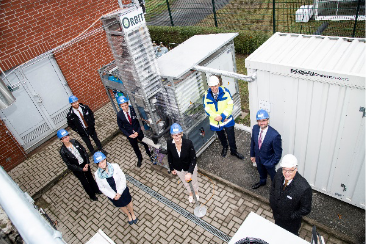- Federal Ministry of Education and Research and the Federal Ministry for Economic Affairs and Energy are advocating the widespread use of climate-neutral gases in Germany
- Energy-intensive industries dependent on climate-neutral gases
At the commissioning of the ORBIT project power-to-gas facility in the city of Ibbenbüren in North Rhine-Westphalia on 23 October2020, the Federal Minister of Education and Research, Anja Karliczek, and the State Secretary at the Federal Ministry of Economic Affairs and Energy, Andreas Feicht, spoke out in favor of the nationwide use of climate-neutral gases in Germany.
Electrochaea welcomes this strong commitment to the application of power-to-methane. The plant in Ibbenbüren uses a microorganism, an archaea, to synthesize renewable methane from hydrogen and carbon dioxide. In view of transition to sustainable energy production and the achievement of climate targets, it is not enough to generate only green electricity, said Federal Minister Karliczek. Energy-intensive industries, such as chemical and steel, cannot be run on electricity alone. Therefore, she said, electricity must be converted into hydrogen and other fuels, such as climate-neutral green methane. These climate-neutral gases can be fed directly into the existing gas networkreplacing fossil natural gas.
This is “good and right” and therefore the Federal Government, the Federal Ministry of Education and Research and the Federal Ministry of Economic Affairsand Energy support plants like the power-to-gas plant in Ibbenbüren. The Federal Minister commended Germany as an international pioneer in the technological advancement of the conversion of electricity into climate-neutral gases. She emphasized the importance of using this technology in large-scale applications throughout Germany and to export the technology worldwide. The Minister was optimistic that this would succeed. “This is exactly what we need,” said the Minister. In view of the economic significance of the technology, the Minister said that its use will also bring new prosperity in the future.
Andreas Feicht, State Secretary at the Federal Ministry of Economics and Energy, emphasized the importance of power-to-X technology in achieving climate neutrality by 2050: “We must be clear about the dimensions of this task,” said the State Secretary. It is not enough to decarbonize the electricity we use, the natural gas we use must also be green. The State Secretary indicated the potential of the power-to-gas to bring green energy to “those sectors that we simply cannot decarbonize with electricity, for technical reasons, for physical reasons, but also for cost reasons”. For testing the technology in a real environment, the energy service and infrastructure provider Westenergie AG, as an associated partner of the ORBIT project, is making its gas network
infrastructure available.
Harald Heß, Head of the Department of Technology at Westenergie, predicted a change in the entire energy sector: “In ten years you will not recognize the energy industry anymore, no stone will be left unturned”. Heß emphasized that in the future there will be new and greater demands on the gas grid in order to be able to cover Germany’s enormous energy needs and achieve climate goals. To this end, he said it was essential to integrate power-to-gas into the system: “The technology is ready for practical application in the energy world.”
Dr. Doris Hafenbradl, Managing Director and CTO of the power-to-methane technology provider Electrochaea confirmed that the technology is “ready to go”.
Germany is a technological leader in this field and is quickly achieving success thanks to well-networked research clusters and good cooperation between individual federal ministries. The recently adopted joint hydrogen strategy has also benefited from this coordination.
“Climate neutral gases are developing into a gigantic growth market”, said Hafenbradl. Germany should use this momentum to build this technology throughout our country and to support the export of power-to-gas “made in Germany” to other countries as a means to slow climate change. “We are prepared to build large plants in series, which will significantly green the natural gas grid”.
However, regulations in Germany must be adapted to support the power-to-gas movement. Germany has good calculation models and possibilities. “Otherwise, we look to the USA, where this technology can be used immediately, because there is a corresponding appreciation for green methane gas, combined with financial support. One can see, for example in California, how these technologies can be used economically and on a large scale. Germany should not only be the country of poets, thinkers and researchers, but also must profit economically from the technologies developed in Germany”, said Hafenbradl.
In October, Electrochaea announced the founding of a U.S. company. In August, the European Investment Council recognized Electrochaea’s biological methanation process as a key technology for implementing the European Green Deal and invested around 17.5 million Euros in scaling up the technology.
About Electrochaea
Founded in 2014, Electrochaea GmbH supplies an innovative, patented technology for the production of high-quality, renewable natural gas that can be stored and used in the existing natural gas grid when needed. The company has successfully operated industrial-scale pilot plants in the U.S., Switzerland and Denmark and is planning multiple plants that will produce combined 15 billion cubic feet per year of renewable methane by 2025.
Electrochaea’s technology was awarded the Swiss energy prize Watt d’Or and listed by the magazine FOCUS as one of the most important technologies for climate and environment. Electrochaea is headquartered in Munich-Planegg, Germany, with offices in Denmark and the USA.

Source
Electrochaea, press release, 2020-11-18.
Supplier
Bundesministerium für Bildung und Forschung (BMBF)
Bundesministerium für Wirtschaft und Energie (BMWI)
Deutsche Bundesregierung
Electrochaea GmbH
Westenergie AG
Share
Renewable Carbon News – Daily Newsletter
Subscribe to our daily email newsletter – the world's leading newsletter on renewable materials and chemicals












